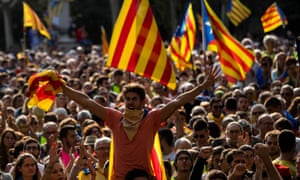Two million Catalans braved the threat of a boot in the face police to demand independence. Like it was a modern and cosmopolitan form of nationalism in Scotland and Greece, the first group that tried to build the barricade were the schukids. They linked the crash barriers together through the alley and tied with wire of an inch thick. The next group, young men with scraggly beard and girls hooded expressed contempt wanted to amass the barriers over some bags of cement. While they discussed options, he came a third group, the original structure dismantled and rebuilt as a fascinating 20 feet deep. This was at the Industrial School on Sunday night, a university complex that serves as
the independence referendum in Catalonia . The vote had been illegal by the Spanish State considered, but mandatory by the Catalan government, most of which had been built around a single issue: independence or failure. At this point, images of police violence against peaceful voters, young and old, passed through social networks. Old fell to the ground; women fleeing beaten with batons; a man jumped half a flight of stairs by a fully armored riot police. These images were horrifying in Europe , but the thousands of people working in the school yard did not seem frightened or surprised. Catalan leader calls for mediation with Spain for independence
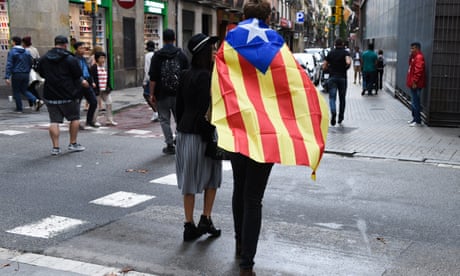
After the referendum on Scottish independence in 2014 , and the Greek vote to reject austerity in June 2015 , people resisting economic and social order in Europe know that terror tactics frightened by the state are part of the agreement. Although brutal, the actions of the Civil Guard on Sunday were calculated: the selection of riot squads outside areas where casual hatred of the Catalans is abundant; in targeting the elderly and women; and the timely nature of the interventions that people in the barricades thought concentrated in middle - class areas. After the Catalan referendum: what happens next?
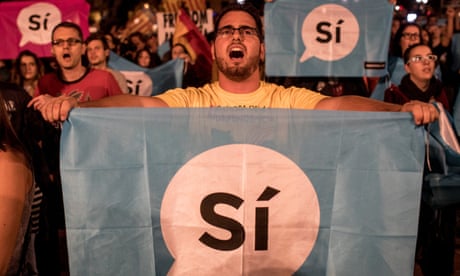
There were thousands of riot police on hand, on ships in the harbor. If Madrid had wanted, he could have confiscated all the polls in a matter of minutes, willingly stuck smartphone application that the Catalan authorities used to compare the results with the electoral roll. But Prime Minister Mariano Rajoy wanted to send a subtle message: let the most ardent separatists had their vote and break their heads, scaring the rest of the population to lack of participation, including any wavering. In the six polling stations I visited in the north and east of Barcelona, only one had been closed. Behind the shattered window of community center Joan Fuster
There were two children aged 15 baseball caps, guarding one urn had hidden riot police. But voters were simply moved to other polling stations: the rear end of the queue for the nearest was just yards away. Throughout the day the vote was slow, because websites were being jammed, election officials said. But still it happened. Is why, amid the blows of cane and rubber bullets, two million people were able to issue an accounting vote, with 90% voting Yes to independence. And they voted, it seemed that a modern cosmopolitan nation was born. That is a rare event in the era of globalization, but may not be the last.
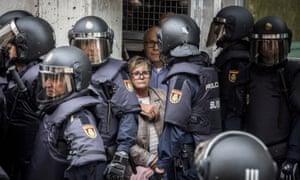 People who resist the economic and social order in Europe know that the tactics of terrorism backed by the state are part of the agreement. Photography: Images UPI / Barcroft In the district of El Clot, a suburb of the working class whose pattern of street dense echoes its medieval origins, the tables were so close that line a thousand people waiting to vote snaked around the block while across the street was another line to a different location. In the few meters between the two tails, real democracy was happening.
People who resist the economic and social order in Europe know that the tactics of terrorism backed by the state are part of the agreement. Photography: Images UPI / Barcroft In the district of El Clot, a suburb of the working class whose pattern of street dense echoes its medieval origins, the tables were so close that line a thousand people waiting to vote snaked around the block while across the street was another line to a different location. In the few meters between the two tails, real democracy was happening.
People stood in the rain and talked in small groups - no hand gestures or raised voices - what to do. This space of the street, with his snuff and occasional smoke marijuana, villages of wet dogs, angry pensioners and council officials requiring all change their phone to airplane mode to reduce traffic to allow the implementation of voting work . If there was consensus was that Catalonia declared independence at dusk, and would have done with Spain.
If such a measure seems illegitimate, it backed by two million potential 5.3 million votes, and in a technically interrupted survey, you have to weigh the amount of democracy against its quality. What I saw in El Clot and other districts corresponds so closely to the original form of Athenian democracy that is worth exploring parallel. The Athenians had equal rights, an equal voice in the assembly, and voted "demes" - small geographical units. They had a popular literacy - in which the language of literature and theater, the economic elite, was understandable for the people. Of course, women were excluded, as slaves, a social apartheid that marred the "ideal".
Catalonia on Sunday saw something like a true democratic participation - and that should make the EU the world and think twice before dismissing everything as a nationalist trick. Riot police prevented people entering school Ramon Llull vote. Photography: Alberto Estevez / EPA Alex, a law student 18 years in the barricade Industrial School, told me that he was not flags, even language: saw a state of Catalan size, free control the Spanish financial elite, as the best way to protect and expand their human rights. "Human Drets, human drets" - that phrase heard whizzing through dozens of conversations.
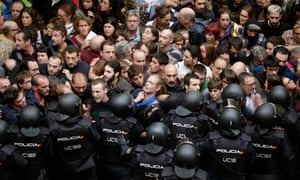
Given the fascist police response and Rajoy incendiary statement that the police had acted "serenely", you can see the point of the Catalans. Walking peacefully on the streets for hours and creating in their own communities a true democracy of coexistence, tolerance and pacifism, showed that the quality of its democratic culture was much higher than that of Franco Franco and types of Opus Dei pulling the ropes in Madrid.
But still they face the same problem as the Athenians; while ancient Athens had slaves and marginalized women, the Catalans have a million foreign residents who can not vote. There are tens of thousands of people in Catalonia who do not speak Catalan by choice; including 10% of those over 75 who say they can not understand. In addition, there are a million non-Spanish residents, ranging from vendors African items at the corners to language students from places as diverse as Japan and Wales, hanging banners from their residences declaring: "We are with you Catalunya" . Although an increasing number of foreigners understand Catalan, they are a minority.
If the Catalan claim of self-determination rested in language, folklore, Sardana dancing ability, it would be wrong rooted in the reality of the XXI century. large and successful cities like Barcelona are always open; we must always allow Spanish speakers and foreigners live, work and settle here - and have full participation in the system of government.
But Catalan nationalism has made a sustained attempt to reconcile with the globalist and cosmopolitan ideologies of modern Europe. Was Montserrat Guibernau, visiting professor at the University Pompeu Fabra of Barcelona and one of the leading academic authorities of nationalism of the century, who coined the term "cosmopolitan nationalism": a sentiment echoed in the last big rally before the vote in Plaça de Catalunya on Friday night, when migrants and refugees were invited to the stage to join a procession of "typical" members of Catalan society.
If Catalonia declares its independence this week, or sets a clear timetable for it, the success of the whole project will depend on its ability to embody cosmopolitanism, which in turn depends on whether the generation that built the barricade can print their values in the nationalism of their elders. Plays video 0:48 Spanish Prime Minister opens talks with Catalan separatists - video
Scottish, Greek and Catalan revolts were driven in part by the failure of the economic model. In 2014, 45% of Scots believed they could better protect their rights, culture and economic future without Westminster; in 2015 62% of Greeks voted to defy economic logic of the euro zone; now two million Catalans have faced the threat of a police boot in the face to demand independence within the EU and the Eurozone.
This creates both challenges ahead for Britain and the EU. The SNP, Plaid Cymru and Sinn Fein sent observers invited by the Catalan government, like the Liberal Democrats, whose leader Vince Cable condemned the repression. Eoin Ó Broin, Irish Sinn Fein MP, criticized the silence of the EU : "Nobody expected to comment on the content of the referendum , " he said. "But there is a real shock here in the absence of condemning the denial of the right to vote first, and police brutality and use of digital methods to disrupt the voting. I'm surprised that nobody in Brussels believe this was unacceptable. "
Sinn Fein's presence and its strong support for the Catalans is not academic. Anglo-Irish agreement includes the promise of a referendum on unity throughout Ireland. In the mid-2020s it is likely that voters antiunion become the demographic majority in Northern Ireland.
The claim of self - determination of Catalonia is strong - and should have been tested in a legal referendum. Instead, the whole crisis has been driven by the Madrid attack to autonomy, driven by the need to impose austerity during Eurocrisis. It is tragic to see the European centrism, which once understood the principle of self - determination, willing to dilute meet the EU standards and economic rationality and diplomatic engagement with mendacious political and Rajoy. Because progressive nationalism is not going.
From George Square in Glasgow, to Syntagma Square in Athens, there was always a Catalan flag waving above the crowd. I never understood until now that those flags were an essential part of the story. Narratives "break" of modern Europe, whether they are moving away from nation states, such as coins, in the areas of free movement or the EU itself, are based on a central fact: the current solution does not work .
the independence referendum in Catalonia . The vote had been illegal by the Spanish State considered, but mandatory by the Catalan government, most of which had been built around a single issue: independence or failure. At this point, images of police violence against peaceful voters, young and old, passed through social networks. Old fell to the ground; women fleeing beaten with batons; a man jumped half a flight of stairs by a fully armored riot police. These images were horrifying in Europe , but the thousands of people working in the school yard did not seem frightened or surprised. Catalan leader calls for mediation with Spain for independence

After the referendum on Scottish independence in 2014 , and the Greek vote to reject austerity in June 2015 , people resisting economic and social order in Europe know that terror tactics frightened by the state are part of the agreement. Although brutal, the actions of the Civil Guard on Sunday were calculated: the selection of riot squads outside areas where casual hatred of the Catalans is abundant; in targeting the elderly and women; and the timely nature of the interventions that people in the barricades thought concentrated in middle - class areas. After the Catalan referendum: what happens next?

There were thousands of riot police on hand, on ships in the harbor. If Madrid had wanted, he could have confiscated all the polls in a matter of minutes, willingly stuck smartphone application that the Catalan authorities used to compare the results with the electoral roll. But Prime Minister Mariano Rajoy wanted to send a subtle message: let the most ardent separatists had their vote and break their heads, scaring the rest of the population to lack of participation, including any wavering. In the six polling stations I visited in the north and east of Barcelona, only one had been closed. Behind the shattered window of community center Joan Fuster
There were two children aged 15 baseball caps, guarding one urn had hidden riot police. But voters were simply moved to other polling stations: the rear end of the queue for the nearest was just yards away. Throughout the day the vote was slow, because websites were being jammed, election officials said. But still it happened. Is why, amid the blows of cane and rubber bullets, two million people were able to issue an accounting vote, with 90% voting Yes to independence. And they voted, it seemed that a modern cosmopolitan nation was born. That is a rare event in the era of globalization, but may not be the last.
 People who resist the economic and social order in Europe know that the tactics of terrorism backed by the state are part of the agreement. Photography: Images UPI / Barcroft In the district of El Clot, a suburb of the working class whose pattern of street dense echoes its medieval origins, the tables were so close that line a thousand people waiting to vote snaked around the block while across the street was another line to a different location. In the few meters between the two tails, real democracy was happening.
People who resist the economic and social order in Europe know that the tactics of terrorism backed by the state are part of the agreement. Photography: Images UPI / Barcroft In the district of El Clot, a suburb of the working class whose pattern of street dense echoes its medieval origins, the tables were so close that line a thousand people waiting to vote snaked around the block while across the street was another line to a different location. In the few meters between the two tails, real democracy was happening.People stood in the rain and talked in small groups - no hand gestures or raised voices - what to do. This space of the street, with his snuff and occasional smoke marijuana, villages of wet dogs, angry pensioners and council officials requiring all change their phone to airplane mode to reduce traffic to allow the implementation of voting work . If there was consensus was that Catalonia declared independence at dusk, and would have done with Spain.
If such a measure seems illegitimate, it backed by two million potential 5.3 million votes, and in a technically interrupted survey, you have to weigh the amount of democracy against its quality. What I saw in El Clot and other districts corresponds so closely to the original form of Athenian democracy that is worth exploring parallel. The Athenians had equal rights, an equal voice in the assembly, and voted "demes" - small geographical units. They had a popular literacy - in which the language of literature and theater, the economic elite, was understandable for the people. Of course, women were excluded, as slaves, a social apartheid that marred the "ideal".
Catalonia on Sunday saw something like a true democratic participation - and that should make the EU the world and think twice before dismissing everything as a nationalist trick. Riot police prevented people entering school Ramon Llull vote. Photography: Alberto Estevez / EPA Alex, a law student 18 years in the barricade Industrial School, told me that he was not flags, even language: saw a state of Catalan size, free control the Spanish financial elite, as the best way to protect and expand their human rights. "Human Drets, human drets" - that phrase heard whizzing through dozens of conversations.

Given the fascist police response and Rajoy incendiary statement that the police had acted "serenely", you can see the point of the Catalans. Walking peacefully on the streets for hours and creating in their own communities a true democracy of coexistence, tolerance and pacifism, showed that the quality of its democratic culture was much higher than that of Franco Franco and types of Opus Dei pulling the ropes in Madrid.
But still they face the same problem as the Athenians; while ancient Athens had slaves and marginalized women, the Catalans have a million foreign residents who can not vote. There are tens of thousands of people in Catalonia who do not speak Catalan by choice; including 10% of those over 75 who say they can not understand. In addition, there are a million non-Spanish residents, ranging from vendors African items at the corners to language students from places as diverse as Japan and Wales, hanging banners from their residences declaring: "We are with you Catalunya" . Although an increasing number of foreigners understand Catalan, they are a minority.
If the Catalan claim of self-determination rested in language, folklore, Sardana dancing ability, it would be wrong rooted in the reality of the XXI century. large and successful cities like Barcelona are always open; we must always allow Spanish speakers and foreigners live, work and settle here - and have full participation in the system of government.
But Catalan nationalism has made a sustained attempt to reconcile with the globalist and cosmopolitan ideologies of modern Europe. Was Montserrat Guibernau, visiting professor at the University Pompeu Fabra of Barcelona and one of the leading academic authorities of nationalism of the century, who coined the term "cosmopolitan nationalism": a sentiment echoed in the last big rally before the vote in Plaça de Catalunya on Friday night, when migrants and refugees were invited to the stage to join a procession of "typical" members of Catalan society.
If Catalonia declares its independence this week, or sets a clear timetable for it, the success of the whole project will depend on its ability to embody cosmopolitanism, which in turn depends on whether the generation that built the barricade can print their values in the nationalism of their elders. Plays video 0:48 Spanish Prime Minister opens talks with Catalan separatists - video
Scottish, Greek and Catalan revolts were driven in part by the failure of the economic model. In 2014, 45% of Scots believed they could better protect their rights, culture and economic future without Westminster; in 2015 62% of Greeks voted to defy economic logic of the euro zone; now two million Catalans have faced the threat of a police boot in the face to demand independence within the EU and the Eurozone.
This creates both challenges ahead for Britain and the EU. The SNP, Plaid Cymru and Sinn Fein sent observers invited by the Catalan government, like the Liberal Democrats, whose leader Vince Cable condemned the repression. Eoin Ó Broin, Irish Sinn Fein MP, criticized the silence of the EU : "Nobody expected to comment on the content of the referendum , " he said. "But there is a real shock here in the absence of condemning the denial of the right to vote first, and police brutality and use of digital methods to disrupt the voting. I'm surprised that nobody in Brussels believe this was unacceptable. "
Sinn Fein's presence and its strong support for the Catalans is not academic. Anglo-Irish agreement includes the promise of a referendum on unity throughout Ireland. In the mid-2020s it is likely that voters antiunion become the demographic majority in Northern Ireland.
The claim of self - determination of Catalonia is strong - and should have been tested in a legal referendum. Instead, the whole crisis has been driven by the Madrid attack to autonomy, driven by the need to impose austerity during Eurocrisis. It is tragic to see the European centrism, which once understood the principle of self - determination, willing to dilute meet the EU standards and economic rationality and diplomatic engagement with mendacious political and Rajoy. Because progressive nationalism is not going.
From George Square in Glasgow, to Syntagma Square in Athens, there was always a Catalan flag waving above the crowd. I never understood until now that those flags were an essential part of the story. Narratives "break" of modern Europe, whether they are moving away from nation states, such as coins, in the areas of free movement or the EU itself, are based on a central fact: the current solution does not work .


